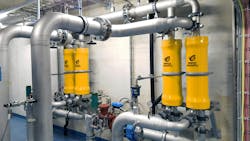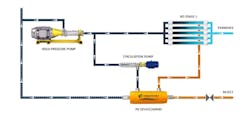Building a sustainable future in Switzerland
Just steps from the shores of Lake Biel in western Switzerland, Energie Service Biel/Bienne (ESB) set out to transform its potable water treatment facility. The objective was clear: deliver clean, safe drinking water to the 70,000 residents of Biel and Nidau, while dramatically lowering the plant’s environmental impact.
The stakes were high. Swiss water utilities are under growing pressure to boost energy efficiency, adapt to climate variability, and remove persistent contaminants from natural water sources. For ESB, this wasn’t just a plant upgrade, it was a commitment to future-ready infrastructure.
Reimagining the plant: reducing chemicals, raising standards
Working with OEM partner Membratec S.A., ESB replaced its existing setup with a reverse osmosis (RO) system designed for energy efficiency and high-purity output. A key innovation: eliminating antiscalant chemicals altogether to improve water quality and minimize chemical handling.
This cleaner approach came with trade-offs. Without antiscalants, the RO membranes produced a lower permeate yield, requiring higher operating pressures, and more energy, to meet output targets.
The energy recovery advantage
To address this energy challenge, the project team turned to the Low Pressure PX Pressure Exchanger (LP PX) from Energy Recovery. By capturing hydraulic energy from the RO reject stream and transferring it to incoming feedwater, the PX system significantly reduces the energy required to treat each cubic meter of water.
Smart design, smarter integration
The redesigned system treats all influent water through ultrafiltration, with half of that flow routed through the RO process. The RO-treated stream is then blended with the bypassed ultrafiltered water, and the combined stream passes through ozonation and granular activated carbon (GAC) filtration.
At full buildout, the facility will include 16 LP PX units, with two PX L180 devices installed per RO train. The plant is designed to treat 1,200 m³/h of raw water, with the RO system handling 600 m³/h—yielding 14,400 m³/day of high-purity permeate.
Thanks to energy recovery integration, the specific energy consumption for the RO system is projected to stay below 0.6 kWh/m³, dramatically improving overall efficiency.
Measurable impact: Energy, cost, and carbon savings
The facility is expected to save approximately 400 megawatt-hours (MWh) of electricity annually, about 30% less energy than a comparable system without energy recovery. These energy savings translate into an estimated $120,000 USD in annual operating cost reductions (based on electricity prices of $0.32/kWh in Switzerland).
The environmental benefit is equally compelling: the design is projected to cut 269 metric tons of CO₂ equivalent (MTCO₂e) emissions per year, supporting Switzerland’s national carbon neutrality goals.
A model of resilience and efficiency
From day one, this project was guided by a simple but powerful principle: sustainable water treatment should be both resilient and efficient. With the integration of the PX Pressure Exchanger, ESB’s facility meets its energy and emissions goals without compromising water quality or reliability.
For utilities facing similar demands, this Swiss project offers a blueprint for the future: optimize RO performance, reduce energy demand at the source, and build for long-term adaptability and sustainability.
To learn more, visit Energy Recovery here.
About the Author

David Kim-Hak
David Kim-Hak, vice president of wastewater at Energy Recovery, brings over six years of leadership within the company. With a background in chemical engineering and a track record of driving innovation and client-focused solutions, he has been instrumental in advancing wastewater technologies and winning global recognition for innovation in desalination.

Angel Abajas
Angel Abajas is sales manager at Energy Recovery, Inc., covering the European market since 2020, he is also board member of the EDS since 2024. Prior to joining Energy Recovery, Angel held several commercial roles for manufacturers specialized on water desalination industry. He has a bachelor’s degree in industrial engineering from the University of Deusto, Bilbao.


